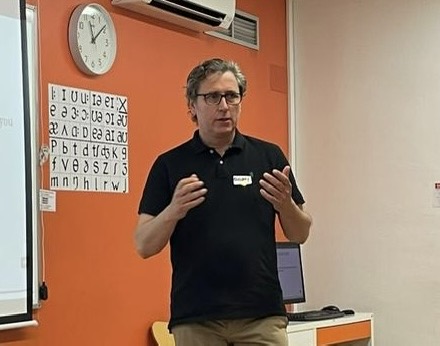Which language to use with your kids in a multilingual family
- Barnaby Griffiths

- Sep 22, 2020
- 3 min read
It’s that time of year where families re-adapt to the old routine after the school holidays. However, as we all know, this year will be different. After the challenges of most of 2020 to date, at least we can be thankful that kids are actually returning to school, for now. The subject of this blog is the result of many conversations I’ve had with parents down the years regarding which language to use in a multilingual family. It may seem like a straightforward question to some parents, but to many it isn’t, and in my capacity as a language coach I have a fairly strong and well-founded view on the matter.
First of all, let me say that my qualifications to voice my opinion on this matter reach beyond being a language coach, although that in itself does provide me with plenty of data. I’m also the father to a young man whose mother tongue is not my own, and I’ve spent years in contact with plenty of parents who speak a language other than the one used around them on a daily basis.

So here are my conclusions: language is contextual. It therefore makes sense to use the appropriate language for the appropriate context. This is what leads many multilingual families to instinctively switch to the language of the country they are in when on the move. In other words, while our son was growing up, when visiting my country of birth, England, my wife would switch from her own mother tongue to English. However, as the representative of English in our household, when we weren’t travelling I would speak to him in English all the time. This could lead to fairly strange interactions involving code-switching (when more than one language is used in the same utterance), and it is precisely this phenomenon that some parents think may be a bad idea or confusing for the child or children. That is not the case, however.
Children are not at all confused by different languages being used at the same time when they are familiar with them. The only negative effect it may have is that as they grow older they struggle to access certain words in their vocabulary bank in one language because they’ve more often heard it in another language due to code-switching. But in the modern globalised world this is simply not a problem. In fact many people find it endearing and love to hear others switch languages and learn new words in a foreign tongue.

But back to the original point, namely, which language to use in a family setting, assuming that both parents can speak each others’ language. In my opinion the answer is that each parent should use their own language when communicating with their child or children, and then in communal settings it depends on the context. A good example is when we used to talk about school, we would all switch to the local language because that’s the one the school used, and constantly trying to translate all of the educational terminology in the middle of a conversation simply doesn’t make sense in that context. By contrast, if we went to see a film in English, then we would all talk abut it in English afterwards.
Another concern that parents have expressed to me is that there may be a lack of unity in the family if they use different languages with their children. I can see their point, but to my mind unity doesn’t stem from using the same language, but rather presenting a united front, which can be done in both languages at the same time. Of course, disparate language use can also be used intentionally to create disunity, but that’s nothing to do with the language, it’s because the parents simply don’t agree on something.

To back up my views, I would refer you to several parents I know who regretted the decision to speak to their children in the local language rather than their own in daily interactions when they were growing up, only realising later that they had missed an opportunity. It caused not only anguish for the parent but also embarrassment when they visited relatives, for example. But further, it represents an academic loss for the child or children concerned, as having learnt a second language naturally is so beneficial when wanting to learn further languages, regardless of whether the parent’s language is widely used or not. And last, but certainly not least, it can also make the parent concerned feel somewhat estranged from their own children, who become accustomed to speaking to them in a language that is not their own.
-----------------------------------------------------------------------------------------------------------------
If you would like to know more about language coaching, whether as a learner or as a language teacher, contact me for a free consultation at barnaby@bglc.es.

Comments